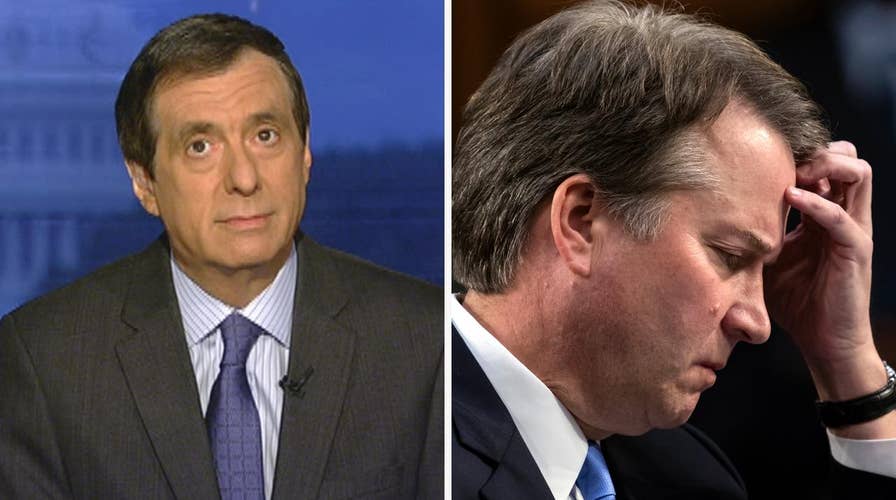Kurtz: How the confirmation process turned ugly
'MediaBuzz' host Howard Kurtz weighs in on how the news media coverage of the Judge Kavanaugh confirmation process has just taken an unexpected and ugly turn with the new allegations of sexual misconduct.
In less than 24 hours, the Supreme Court confirmation process has been utterly transformed from a virtual certainty to a dramatic dilemma.
When Brett Kavanaugh faced only an unnamed accuser with a vague story about something that allegedly happened nearly four decades ago, when he was at Georgetown Prep, it was clear that the Republicans had no intention of slowing down the train. And a rough media consensus, including some on the left, decided that this was a late hit and an unfair one at that.
But when Christine Blasey Ford came forward to The Washington Post, she changed the equation. And when her lawyer said on two morning shows yesterday that Ford is willing to testify, it created an unstoppable momentum that forced Judiciary Chairman Chuck Grassley to invite her and Kavanaugh to testify next Monday. Once Jeff Flake and Susan Collins joined the call for hearings, there was no turning back. So much for Grassley's initial suggestion that they just chat by phone.
Kavanaugh, too, with an expanded but equally vociferous denial, said he is willing to testify. So the initial proposal by Judiciary Chairman Chuck Grassley, that both be interviewed over the phone, looks dead in the water.
Even President Trump, whose first instinct is always to counterattack, was restrained in comments about his nominee.
While praising Kavanaugh, the president also said, "I wish the Democrats could have done this a lot sooner, because they had this information for many months. And they shouldn't have waited til literally the last days. They should have done it a lot sooner. But with all of that being said we want to go through the process."
And he added: "If it takes a little delay, it'll take a little delay."
Earlier, Kellyanne Conway said that "this woman should not be insulted and she should not be ignored."
Much of this is driven by math. With Jeff Flake, who is retiring, and Susan Collins saying there should be hearings, and the Republicans holding only a 51-49 majority, two defections could kill the nomination, even if the GOP bypasses the committee for a floor vote.
Look, the process was terrible. Dianne Feinstein had been sitting on the anonymous letter since July. Even the liberal editorial page of the San Francisco Chronicle said Feinstein was "unfair" to everyone—the nominee, the accuser and the panel’s members. The 11th-hour nature of the charge makes it look like desperation politics.
In the Post interview, Ford, now a research psychologist at Palo Alto University, expanded on her account, saying that Kavanaugh groped her as he tried to pull off her bathing suit and put his hand over her mouth when she screamed.
"I thought he might inadvertently kill me," Ford told the paper. "He was trying to attack me and remove my clothing."
And on "Today," her lawyer Debra Katz said that Ford "clearly considers this an attempted rape. She believes that if it were not for the severe intoxication of Brett Kavanaugh, she would've been raped."
The Post examined a therapist's notes from 2012, which "do not mention Kavanaugh's name but say [Ford] reported that she was attacked by students 'from an elitist boys’ school' who went on to become 'highly respected and high-ranking members of society in Washington.' The notes say four boys were involved, a discrepancy Ford says was an error on the therapist’s part."
Orrin Hatch, meanwhile, says he spoke to Kavanaugh and the judge maintains that he wasn't even at such a party, with the senator suggesting this is a case of mistaken identity.
So here is what the senators, the media and the public have to face:
An allegation of attempted rape is extremely serious. It can traumatize a woman for the rest of her life. The fear can linger for a very long time. It can't simply be written off as old news.
At the same time, if Kavanaugh did anything like what is alleged, he was a high school student. He has since built an outstanding career, worked well with women, coaches his daughters' teams--and 65 women who knew him at Georgetown Prep have vouched for his character. Should a horrible, drunken episode at the age of 17 ruin a man’s career decades later?
But Kavanaugh says unequivocally this never happened. If lawmakers were to conclude otherwise, they could deem him to be lying — as an adult.
Throw in all the twists and turns as journalists dig into the matter and the testimony that will rivet the nation next week under the glare of television lights. No one, at this point, knows how this will play out.













































